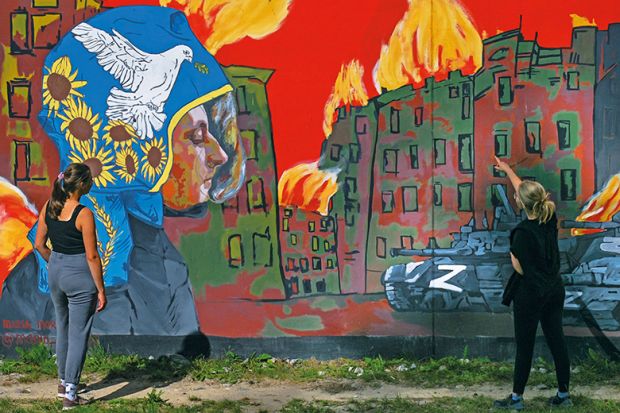Given the slow pace at which universities typically add new programmes, the history course “The Ukrainian Crisis and Its Historical Roots” was, well, historic.
Approved just four days after the Russian invasion of Ukraine in February, it got under way at the University of Nevada, Las Vegas, four days after that.
But while it may have been among the first new classes at American universities to focus on Ukraine since the outbreak of this war, it was a harbinger of many more to come.
In the new academic year just under way, Ukraine has become the focus of a legion of quickly added courses at US universities, or been embedded into existing ones, in disciplines from history to politics and international relations to literature, language, art, film and media studies.
“It’s about arming students with the knowledge that permits them to ask probing questions of the news they’re consuming,” said the leader of the Nevada course, history chair and Russia expert Paul Werth. “A lot of students are very mindful of their ignorance, in a good sense, and want to know more.”
Academic presses are having trouble keeping up with the demand for once-obscure books about Ukraine. And American academics are supporting their Ukrainian counterparts with money, research help, access to libraries and other support.
At Indiana University, a new non-residential Ukraine Scholars Program attracted 237 applications, mostly from academics and doctoral students still in Ukraine, said Sarah Phillips, professor of anthropology and director of the university’s Robert F. Byrnes Russian and Eastern European Institute.
With contributions from the schools of law, business and education, the Jewish studies programme and individual scholars who pitched in research funds, the programme was expanded from the original 20 fellows to 30.
“Ukraine is a case study for so many things that we want our students to understand: what active citizenship looks like, democracy, protests, humanitarianism, migration,” said Professor Phillips.
Vermont’s Bennington College has introduced a “real-time” course titled “The War in Ukraine”, designed to help students process and contextualise events as they unfold. Indiana University has debuted a seminar in international law called “Russia and Ukraine: Law, Power and Global Order”; a course on media manipulation there now includes a section about Russian disinformation campaigns. At Lehigh University, an art historian whose family is from Ukraine has added Ukrainian examples to his course in 20th-century art.
The tiny publishing house Academic Studies Press in Boston, one of whose specialties is Ukrainian translations, “couldn’t get anyone to pay much attention” to its Ukraine-related titles before February, sales director Matthew Charlton said. Words for War: New Poems from Ukraine, for instance, had sold fewer than 300 copies since it came out in 2017.
Since the war began, it has had trouble keeping up with orders, many of them for new courses and library acquisitions at universities in the US and the UK.
“Of course nobody’s happy that this is the reason why it’s taken off, but the writers are very excited that their literature is becoming much more recognised,” said Mr Charlton.
Some faculty have personal connections to the topic. Dinissa Duvanova, whose father is Russian and whose mother is Ukrainian, first proposed teaching the course “Ukraine at the Crossroads: Regime Change and International Politics” at Lehigh just after the Russian annexation of Crimea.
But colleagues doubted that there would be student interest, and the idea was shelved until now, when the class has filled up with not only international relations but also economics, political science and even engineering majors.
Dr Duvanova, an associate professor in international relations, said she hoped to use the opportunity to correct what she saw as a long-standing Russian-centric approach to Eastern European issues.
“Western academia has contributed to this sort of neocolonial myth that Ukraine is not really a separate country,” she said. Until 2014, “we did not really recognise the independence of Ukraine as a subject for our attention”.
She and others attributed the attention to Ukraine in classrooms nationwide mostly to students’ interest in a topic that pops up daily in their social media feeds, however.
“We were blown away by the amount of response and reaction and turnout,” said Michael Butler, associate professor of political science at Clark University, who is teaching one course called “Just and Unjust Wars” and another titled “Peace and War” that will use the conflict in Ukraine as a pre-eminent case study.
“Ukraine has proliferated so rapidly through the kinds of outlets students tend to consult, and that has spawned a remarkable degree of interest in European politics again, in great power politics again, which had sort of fallen off,” Dr Butler said.
Nevada’s Professor Werth said he has been struck by the degree to which his students want to learn more.
“Students are very conscious of the limitations of their knowledge. I was impressed that they were reserving judgement,” he said. “That’s not to say they weren’t horrified or pro-Putin, but I think they intuitively understand that these things don’t just happen.”
Register to continue
Why register?
- Registration is free and only takes a moment
- Once registered, you can read 3 articles a month
- Sign up for our newsletter
Subscribe
Or subscribe for unlimited access to:
- Unlimited access to news, views, insights & reviews
- Digital editions
- Digital access to THE’s university and college rankings analysis
Already registered or a current subscriber? Login








